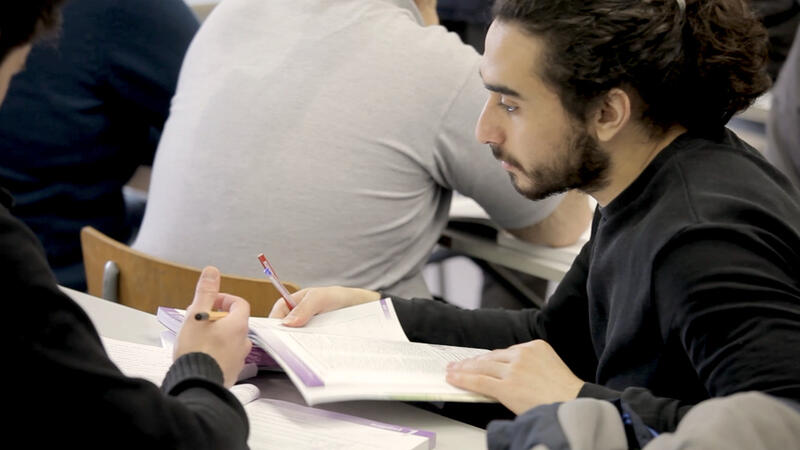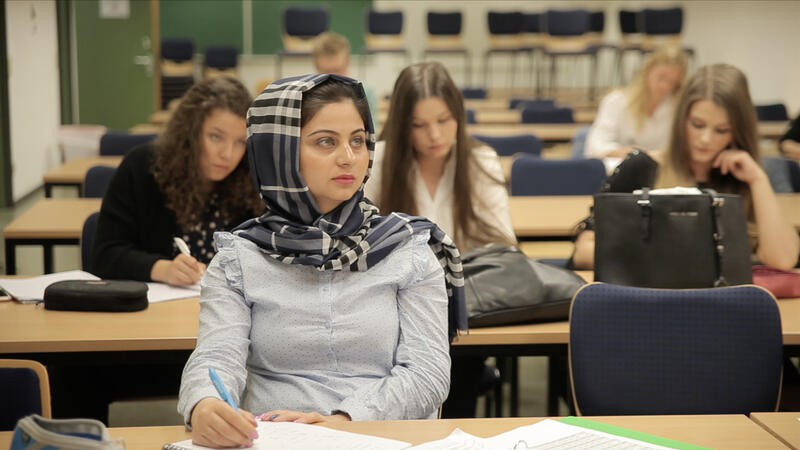Student Finance
What types of financial aid are available to students?
Financing your studies is one of the major issues you have to deal with before enrolling at a university. Fortunately, most public universities in Germany do not charge tuition fees, but studying, in principle, costs money: Every semester, you have to pay a semester fee, buy books and, of course, continue to maintain your livelihood.
In addition to student jobs and BAföG, there are also numerous scholarships as well as special loans and other financing options for students in Germany.
What options do I have?
Many public and private organisations, universities, federal states, districts and cities in Germany offer scholarships for students. Some of these scholarships are specifically for refugees. Most scholarships cover the cost of the semester fees, everyday living and possible tuition fees- and you do not have to repay them. Unfortunately, there is no complete database of scholarship programmes available in Germany- the German Academic Exchange Service (DAAD), however, has a database of scholarships for international students. You can also search for a scholarship on MyStipendium or Begabungslotse websites.
Furthermore, foundations provide many scholarships at different levels. You can find an overview of scholarships provided by foundations on the webpage of the Federal Association of German Foundations ("Bundesverbands Deutscher Stiftungen"). As soon as you are enrolled at a university, you can seek advice from the students' union ("Studierendenwerk") or take part in informational events concerning funding at your university.
Please note: Scholarships differ in their duration. While some scholarships offer financial support for the entire duration of your studies, others are only valid for a limited period of time, often just a few months. It therefore makes sense to find out the exact duration of the scholarship before applying. This will give you a better overview of your financial planning.
"Bildungsberatung Garantiefonds Hochschule" is an organisation which financially supports young refugees and repatriates who want to study. The scholarships of the Bildungsberatung Garantiefonds Hochschule are intended for young people who wish to attend a preparatory colleague ("Studienkolleg") or a German course (in C1, TestDaF or DSH level). They cover the tuition fees and costs of living, and you do not have to repay anything. If you live in Germany and are under 30, you can apply for this grant. Please note: The previous regulation which required that you only apply for "Garantiefonds Hochschule" within the first two years of your arrival in Germany no longer applies.
You can find a counselling centre of the Bildungsberatung Garantiefonds Hochschule in your area on bildungsberatung-gfh.de. You can send the application (online or per mail) to the Education counselling Center ("Bildungsberatungsstelle") in your area. To apply online, visit bildungsberatung-gfh.de. You can find a printable version of the application form on the website of the Bildungsberatung.
If you have a particularly good performance at school or university and are involved in social initiatives, you can apply for an educational grant for the particularly gifted students ("Begabtenförderung"). You do not have to pay back what you receive in this framework. The scholarships are awarded by 13 organisations which provide educational grants for the particularly gifted students in Germany- these organisations are funded by the Federal Ministry of Education and Research (BMBF). These 13 organisations have different ideological, political or denominational orientations, hence different criteria in their choice of applicants. For instance, the Avicenna study programme is aimed mainly at socially active Muslim students, including doctoral students. These organisations support students in all degrees, which means you can also apply as a doctoral candidate.
If you have particularly significant academic accomplishments, you can apply for the National Scholarship or "Deutschlandstipendium" which amounts to € 300 per month. National Scholarship is not a loan, which means you do not have to pay back the money. You have an increased chance of receiving this grant if you are socially active. Migration background and experience of flight or political persecution are also considered to affect the selection process positively. However, not all universities participate in the programme. Ask your university if the “Deutschlandstipendium” is offered there. As a doctoral candidate, you cannot apply for the National Scholarship.
The training loan programme is funded by the Federal Administration Office ("Bundesverwaltungsamt"). It offers financial support for advanced students, so you cannot apply for this financial support if you are in the first year of your bachelor's degree. The loan can also be applied for in addition to BAföG. Unlike BAföG or regular loans, your income does not matter here. All advanced students under the age of 36 who have a residence permit in Germany can apply for the training loan programme. If you have a tolerated stay permit ("Duldung"), you must have lived in Germany for at least four years before you can apply for the programme. Unlike BAföG, there are no grants involved here, which means you have to repay the full amount plus interest. The loan is offered in monthly instalments of € 100 to € 300. Overall, the amount of credit can reach up to € 7,200. However, applying for it only makes sense if you know that you will be able to repay what you ow in the future. The repayment starts four years after receipt of the first instalment. To participate in a training loan programme, you can apply online at the Federal Administration Office.
Students are allowed to work along with their studies. There are, however, some issues to keep in mind. You can read more about these rules and regulations in our chapter “Student Jobs”.
As a student, you have some opportunities to save money:
- All universities have student residences, which are, in principle, affordable housing options. Often, however, it is necessary to register early on for a place in a student dormitory, as the number of rooms or apartments are limited. To learn more about dorms in Germany visit studierendenwerke.de.
- As a student under 30, you can benefit from the student rate of statutory health insurance and pay a lower fee for your coverage. If you are older than 30, using the "health insurance for students" scheme ("Krankenversicherung für Studierende") is only possible in exceptional cases. For more information, seek advice from your health insurance company. You can find more information about student insurance (in German) at verbraucherzentrale.de.
- Many universities offer so-called "Semestertickets" for public transportation, the price of which is usually included in semester fees. With a semester ticket, you can use buses, subways, suburban trains and trams in your city and often also certain trains in your state for free. If you do not have much money, it is sometimes possible to have the cost of the semester ticket reimbursed. This will reduce your semester fee. You can find out more, for example, from AStA or the General Students' Committee (in German).
- Students also often receive discounts on various cultural activities, such as theatre, cinema, etc.
- Check whether you are entitled to housing benefit or other forms of financial support. Sometimes there are regional or student-specific grants available.
- Another way to save money as a student in Germany is to file a tax return. You can deduct certain expenses as income-related expenses, for example textbooks and other resources, travel costs, work equipment and tuition fees. Foreign students can also deduct costs for finding accommodation, moving to Germany and back, one trip home per calendar year, German courses and the translation and certification of official documents. Make sure you keep all relevant receipts and seek advice from experts on which costs you can deduct from your taxes.
Important
Political engagement and voluntary service can increase your chances of success in most scholarship programmes, i.e. if you are a member of an association or work as a volunteer in the fire brigade.









